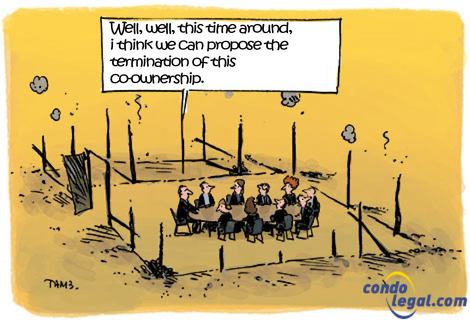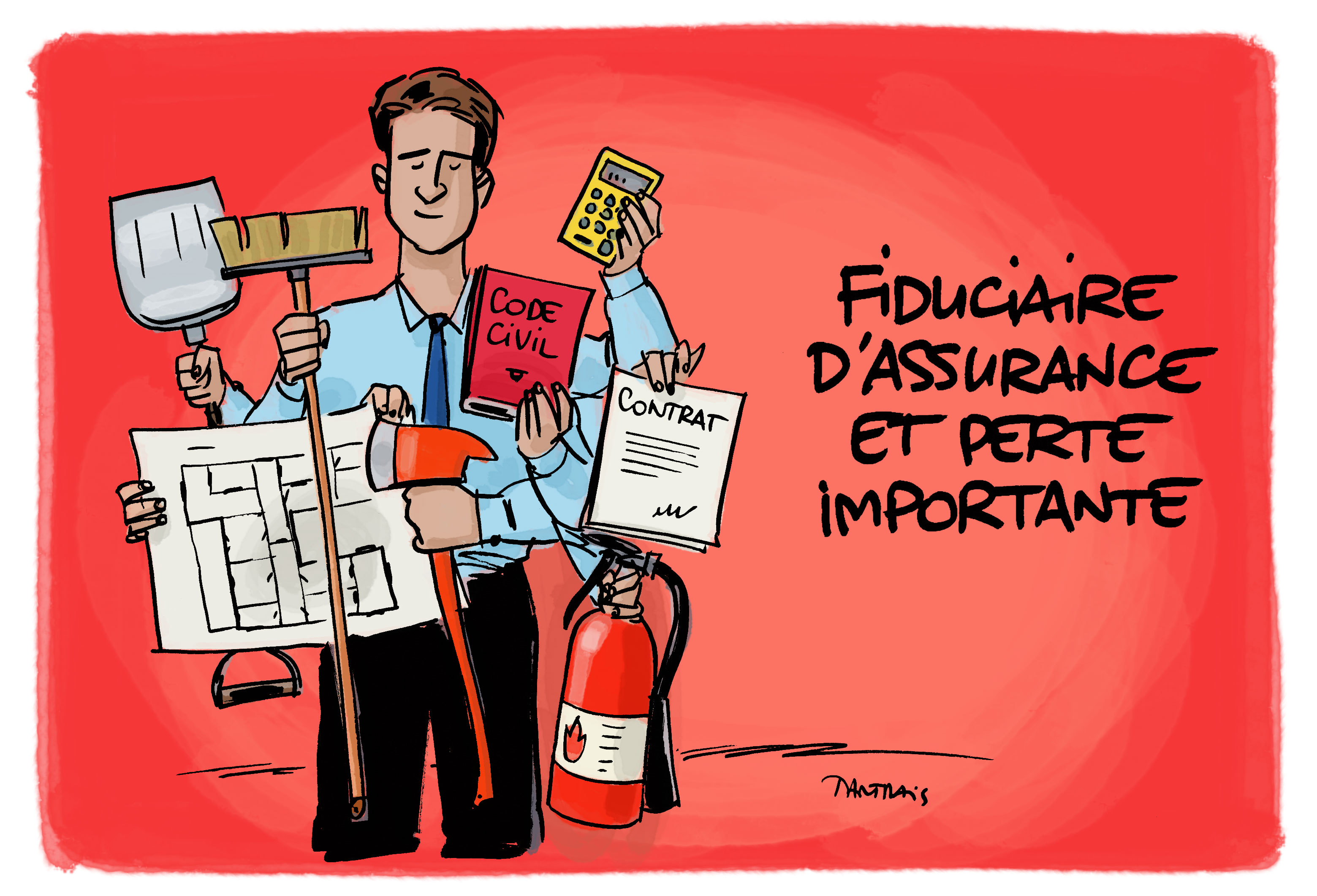 Any co-ownership can one day face a major disaster. For example, a fire might ravage several units, or water damage might affect multiple floors due to a burst pipe. These situations lead to very high repair costs and are classified as "substantial loss". The financial burden can be overwhelming for individual co-owners and the syndicate. Managing the insurance indemnity by the board members can be extremely complex. Proper allocation of these funds requires careful planning and expertise. Inadequate management of insurance indemnities exposes directors to significant risks, including legal and financial consequences.
Any co-ownership can one day face a major disaster. For example, a fire might ravage several units, or water damage might affect multiple floors due to a burst pipe. These situations lead to very high repair costs and are classified as "substantial loss". The financial burden can be overwhelming for individual co-owners and the syndicate. Managing the insurance indemnity by the board members can be extremely complex. Proper allocation of these funds requires careful planning and expertise. Inadequate management of insurance indemnities exposes directors to significant risks, including legal and financial consequences.
Role of the insurance trustee
If your co-ownership suffers a "substantial loss" you will be required to use the services of an insurance trustee, in accordance with article 1075 of the Civil Code of Québec. This article states that "The indemnity owing to the syndicate following a substantial loss is, notwithstanding article 2494, paid to the trustee appointed in the act constituting the co-ownership or, where none has been appointed, to a trustee who must be designated without delay by the syndicate.". The insurance trustee is a key person. His role is to manage the indemnities paid by the insurer. It ensures that the money available is in fact used to "repair or rebuild the immovable". All in all, the interest of the co-owners and their hypothecary creditors is protected. Indeed, it is in their best interest that the immovable is repaired or even rebuilt.
What is a "substantial loss"?
It is a loss resulting in a large indemnity following an occurrence affecting a large portion of the immovable. Most declarations of co-ownership published after January 1, 1994, the date on which the new Civil Code of Quebec came into force (generally) specify that damages affecting from 10% to 25% of the immovable constitutes a "significant loss”.
The appointment of a trustee
Unless the declaration of co-ownership (Constituting act of the co-ownership) already provides for the appointment of the trustee, it is usually up to the Board of Directors to appoint a trustee; the latter does not have to call a general meeting of co-owners to take that decision.
Choosing the appropriate trustee
Before selecting the trustee who should in principle look after your interest, ensure the trustee is qualified, has professional liability insurance and is assisted by building professionals (e.g., engineers and architects). If the person mandated is a member of a professional order, make sure his insurance coverage applies to the actions to be undertaken by an insurance trustee.
The trustee must know how a co-ownership operates, more particularly its legal framework. The Law requires him to be a "person fully capable of exercising his civil rights", or a "legal person authorized by Law".
In addition, he must demonstrate the utmost transparency in the performance of his duties; for example, he should not be in a conflict of interest with some co-owners living in the immovable, the insurer or building professionals participating in the repairs or rebuilding. A lawyer or a notary whose co-ownership expertise is recognized meets these criteria.
One does not "improvise" being a trustee
Unfortunately, some people improvise being insurance trustees. In reality, they do not have the qualifications to assume this role. Worse still, they are often not members of a professional order and may not be covered by professional liability insurance. In such cases, if the trustee misappropriates funds or misuses the indemnities for which he is responsible, your syndicate may face serious difficulties to be reimbursed or compensated. Also, remember that once the insurer has paid the indemnity to the trustee appointed by the syndicate, the insurer will not be liable for any further action.
A heavy burden
The credibility of the trustee rests on many different aspects, including those regarding the actual work of bringing the immovable back to its original state. In this respect, he must verify the contractor holds a license issued by the Régie du bâtiment du Québec, (Québec Construction Board), pays his contributions to the “Commission des normes, de l’équité, de la santé, et de la sécurité du travail” (Labor Standards, Equity, Health and Safety Commission) (CNESST), and also to the “Commission de la construction du Québec” (Quebec Construction Commission) - (CCQ).
He must also retain the services of a competent contractor, otherwise the immovable may be affected by design or construction defects once renovated or rebuilt. Another important aspect of a trustee’s responsibility is to ensure the contractor pays the amounts owing to subcontractors. Otherwise, the risks of the registration of a legal hypothec of construction on the immovable are very high. The Law authorizes any person who has "participated in the construction or renovation of an immovable" to publish such hypothecs.
Termination of the co-ownership
On the other hand, if the co-owners wish to terminate the co-ownership following a loss, due to a substantial or total loss of the immovable, the trustee must first redistribute the money to prior claims and hypothecary creditors. To this end, he must follow the rules of article 2497 of the Civil Code of Québec.
The balance is transferred to the liquidator of the syndicate, which remits it to the co-owners using the relative value of their fraction to calculate their reimbursement.
 WHAT YOU SHOULD KNOW! The insurance trustee must have sound knowledge of co-ownership law. He must also be dealing at arm’s length with the parties. In this regard, a lawyer or a notary well versed in co-ownerships is a good choice.
WHAT YOU SHOULD KNOW! The insurance trustee must have sound knowledge of co-ownership law. He must also be dealing at arm’s length with the parties. In this regard, a lawyer or a notary well versed in co-ownerships is a good choice.
 WHAT TO KEEP IN MIND: The trustee's mission is very complex requiring good knowledge of co-ownership’s law. It must be carried out seriously and with professionalism. Failing observing the aforementioned principles, several co-owners could face dire consequences.
WHAT TO KEEP IN MIND: The trustee's mission is very complex requiring good knowledge of co-ownership’s law. It must be carried out seriously and with professionalism. Failing observing the aforementioned principles, several co-owners could face dire consequences.
 WARNING! Some organizations offer the services of a trustee free of charge. In fact, these services are free only at the time of his appointment. Remuneration may be required as soon as the latter intervenes after a loss. So, beware of misleading advertisement!
WARNING! Some organizations offer the services of a trustee free of charge. In fact, these services are free only at the time of his appointment. Remuneration may be required as soon as the latter intervenes after a loss. So, beware of misleading advertisement!
![]() CONSULT THE PUBLICATION: Condo Insurance, Everything You Should Know, at pages 67 and following.
CONSULT THE PUBLICATION: Condo Insurance, Everything You Should Know, at pages 67 and following.


